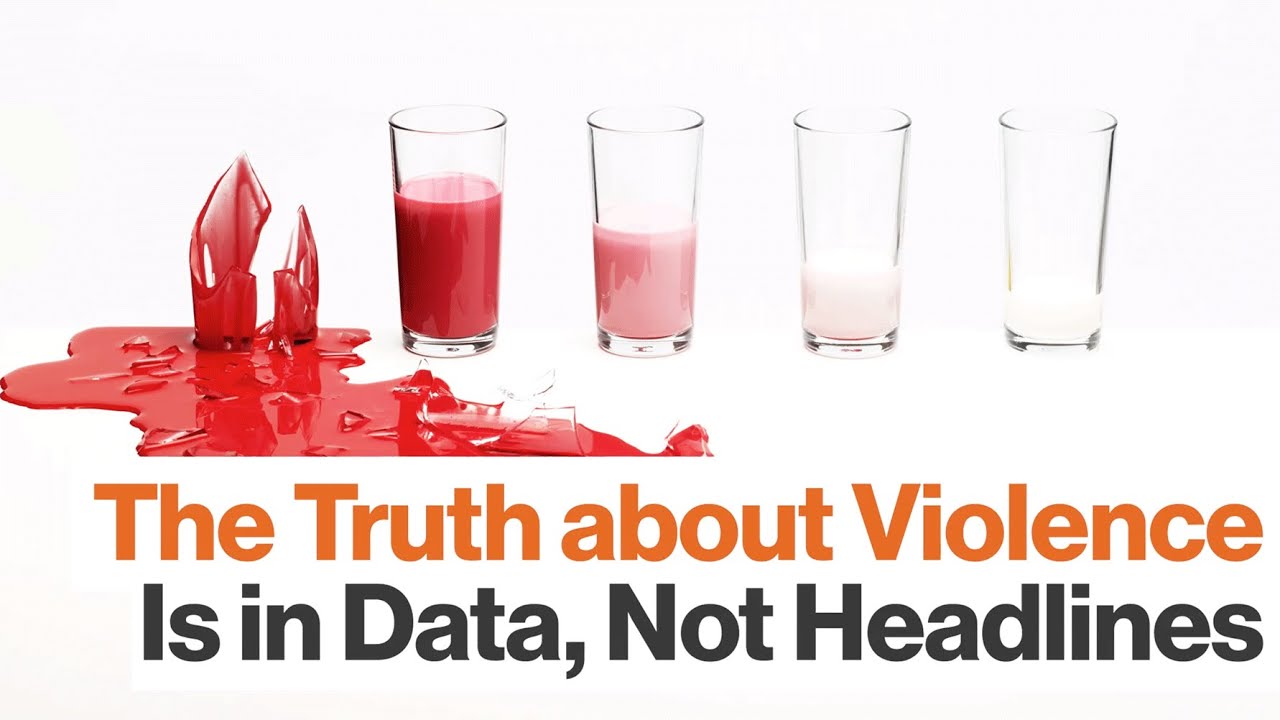Big Think
Read more at BigThink.com: http://bigthink.com/videos/steven-pinker-on-data-and-the-history-of-violence
Follow Big Think here:
YouTube: http://goo.gl/CPTsV5
Facebook: https://www.facebook.com/BigThinkdotcom
Twitter: https://twitter.com/bigthink
Transcript – Historic trends in violence can’t be assessed by headlines. Headlines are about things that happen and they give you no indication whatsoever of how common a particular activity is. Because you never see a reporter standing outside a school saying here I am in front of Maplewood High School, which hasn’t been shot up today. Or here I am in the capital of Mozambique and there’s no Civil War. So forget headlines, the only way to answer the question of what are the trends in violence is to look at data where you count the number of occurrences as a proportion of the number of opportunities and you see whether that’s changed over time. So since I wrote Better Angels of Our Nature I sent it off to the press in the end of 2010, so the data that were available were from ’08 /’09, I keep yearly updates on what’s happened to those trends. And with the exception of Civil War, which after a roller coaster downward from the end of World War II, has shown something of an uptick because of the Syrian Civil War. It’s wiped out about 13 years of progress taking us back to the level of about 2000, but it’s still a fraction of the level that it was at in the ’60s, ’70s and ’80s when you had not just eight or nine civil wars going on at a time but 25 or 30. We tend to forget them. We tend to be amnesic about all those nasty wars in Africa and South East Asia that were going on in the ’70s and ’80s, but a lot of them had a considerable death toll. So clearly things have gotten worse in Syria. They’ve gotten worse in Ukraine, in Pakistan, but the global trend has not reversed the progress that we have seen by any means. All the other trends such as homicide, which kills far more people than wars, continues to go down. Sexual violence, at least in countries that have good data, have continued to go down, rape and domestic violence, child abuse has continued to go down.
More and more states and countries have abolished capital punishment. Even democratization, absence of government violence where we’re aware of backsliding in countries like Venezuela and turkey and Russia, but still the global trend continues to be that the world is getting more democratic. We don’t read about the countries that have liberalized but we hear about the countries that increase their repression. And they do exist, but on the whole the world has become more democratic as well as less homicidal, less gender-based violence, less child abuse and so on. And even in the category of war you can divide wars into wars between countries, old fashion wars of country A declares war on country B and civil wars. And the first category, interstate wars, government on each side, has been in kind of puttering decline for many decades. There are fewer and fewer wars between countries. The wars that exist are civil wars. And that record has continued to improve; namely we’ve had zero interstate wars since The Better Angels of Our Nature was published. And in fact we’ve had zero interstate wars since the American invasion of Iraq in 2003. And historically, wars between countries tend to kill more people than civil wars. So even with the backsliding that we’ve seen in the case of Civil War, in the case in the most destructive form of wars, the world is still not seen a return to the bad old days of the ’70s and ’80s.
Source




"We've had zero interstate wars since…"
Yes, all you have to do is bomb, burn, and starve people without a declaration of war, and it's therefore not an interstate war. All you have to do is not recognize a nation State (Palestine), and therefore it's not an interstate war.
Seems stats are a bit skewed, based more on accepted labels of some than data itself. Thumbs down for a bit of intellectual dishonesty.
can't wait for when all the fear porn to be over with. same with all the separation between people on this planet as well -_-
Where could I find a good source for unbiased statistics for trends like those mentioned in the video?
Most of what he states appears sound except for wars between countries vs civil wars. Many of the civil wars we see nowadays are actually proxy wars between nations.
I love everything that was said in this video. I've known about these statistics for a very long time, yet people still say things like, "the world is so violent these days," or, "Nothing happened like this when I was a kid." Basically, news is a lie. If you want facts, research them, and find them yourself. Also, I can't believe how much this guy looks like Rob Lowe from "Parks and Recreation."
Yeah, except in Germany & Sweden. Rates of rape & child molestation have skyrocketed. Not bc of the massive population, either. Regardless of what feminists & regressives say, it's the Muslims running rampant like savages.
They've needed to create a new class of violent sexual assault there, called a Pool Assault, bc so many women & children have been raped & molested by Muslims that they couldn't categorize it properly.
Some towns have attempted to ban Muslims from public pools & been shot down by federal govs, only for the assaults to continue.
not a word about terrorism.
great update for the book.
Wow! Big Think's 2nd rational anti-regressive video! Let's go over some FBI crime stats here in America and see what the stats say per demographic on a per capita level playing field!
omg they got steven Pinker!!!
but doesn't Russia annexing Crimea considered as interstate war?
It's surely a good point that headlines misrepresent frequencies, but it almost seems that he's implying that everything will be fine in future because the data says so. obviously data are the most important source of information, but on its own, data is vulnerable to the assumptions that it captures everything important about the world. I'll put my faith in someone as reflective as Pinker to have considered this, but perhaps a 4 minute video is the wrong medium to get across the complexities of relying on 'the data'
religion is also on a decline. Ramen
But what about the war substitutes? Drones have killed a lot of people in the last decade and those without drones use guerrilla tactics to kill and disrupt those they oppose. I'm curious how those trends are going.
Well, this isn't something that people haven't been saying for years. We know this, but somehow we tend to ignore this. I think human reaction might be more important to us than data. If we get on facebook and read comments to an article, those comments might mean more to us than anything else, even if they're not balanced. We also might get a rush of inspiration or compassion when we go out in the real world and we actively protest or witness someone protesting. If we see a smaller person being attacked by a larger person, we tend to defend the smaller person, even if we don't know the full story. All of the emotions and everything else that goes into being a part of something and interacting with other people usually has a bigger impact than reading data, even if we are wrong.
Where does the "War on drugs" fit in?
Main stream media don't seem to report all violence occurrences, and many violence crimes aren't reported to police for fear of retaliation and some are even not registered by police even if a complaint is reported. Look at what happened in Dearborn, and in Germany and Sweden and France… So I would take Stevens input with a grain of salt, not completely wrong, but definitely not completely right either.
I love you Steve!
he is being paid to lie about everything, he is a reptilian overlord that rapes and eats children as young as 3
according to some feminists rape isnt going down due in part to them making EVERYTHING count as rape from catcalling (which at times is disrespectful but even something like calling the woman beautiful then walking away is seen as a horrable atrocity) to domestic violence (which hitting your partner is wrong but to say that is rape is sadly misinformed) hell there have even been videos made saying when you hit a woman every woman in the proximity is "raped"
America and france bombing syria could be counted as "inter-state" war dont you think?
Many countries will engage in conflicts not wars. Violence is still violence. I would be curious to know if you added conflicts to his numbers, would his findings be backed up? The Vietnam conflict was not a war, but still killed quite a few people.
That tie tho.
This man should be played by Rob Lowe in any relevant upcoming movie.
Where can I get that tie??
Doesn't the Russian invasion of the Ukraine count as a 'War Between Countries"?
Talk about putting a spin on some data. lol. He's just another military industrial complex acadamia mouthpiece to pacify us into ignoring things like US involvement in clandestine/proxy wars.
The latent message I get from him is, "Relax, masses. If there is less war and violence overall, then we have no right to complain about the remnant violence we still [do] have in the world".
It kind of implies a sort of "don't worry, be happy" apathy towards the inequities that still exist today.
….and Pete's sake, somebody get him to cut that godforsaken mullet!!! lol.
Dear Professor, what can the world do to fix the situation in undemocratic countries? Do you have any suggestions?
If you cover his nose and mouth with your hand he looks like Einstein.
So he isn't calling Russia's taking of Crimea an act of inter-state aggression?
I dont actually believe your data
what planet do you live on ??????
what about all the wars the US has created. civil wars……bullshit
Too bad he doesn't know how to analyze data: http://www.fooledbyrandomness.com/violence.pdf
Apparently, 19 people so far rather believe in headlines other than actual data.
I guess most of the people who believe in headlines didn't even bother to watch this video.
I remember i told my grandparents that violence has been going down steadily for decades and they refused to believe me. A lot of people like the narrative of being a victim in a big bad crazy world. It's just not true.
Am I the only one who noticed the fresh paint on the wall?
Maybe there is hope for mankind, yet 🙂
If we dont count Ukraine, Russia still invaded Georgia in 2008.
Civil wars funded and fueled by stronger outside governments.
I've just read Mr. Pinker's book.
It was so surprising to find out that 'the good old days' of the 70's where you could send your kids outside to play was actually more dangerous than today, where you are made to feel like you can't let your kids out of your sight for a second.
I have to wonder if there is an uptick of violence since Donald Trump has been elected? Does anyone have a link to a newer article or video from Steven Pinker on this subject?
Brilliant and refreshing video. Kudos!
Compared to our little spacepod brains, Steven Pinker's brain is an friggin mothership
Excellent, now our goal is to make sure that trend continues. Progress is beautiful
I don't want to negate the importance of data. But, that's only part of the story. Another part is motives, values, intentions, mistakes, evaluations, and other subjective factors. You really don't want to rely on data/evaluations with one side of the brain tied behind your back.
Of course, there's less violence. The empire has more control over the people. Don't underestimate the threat of an Iran/U.S. war nor a full-blown war between the U.S. and Russia. There is a proxy war between both countries that are ongoing as we speak, and the Middle East has been destabilized so much that the potential for war persists in that area between Qatar, Saudi Arabia, Iran, Russia and the U.S. We are being driven towards war; even as the data indicates a drop in violence between countries.
More guns, less war